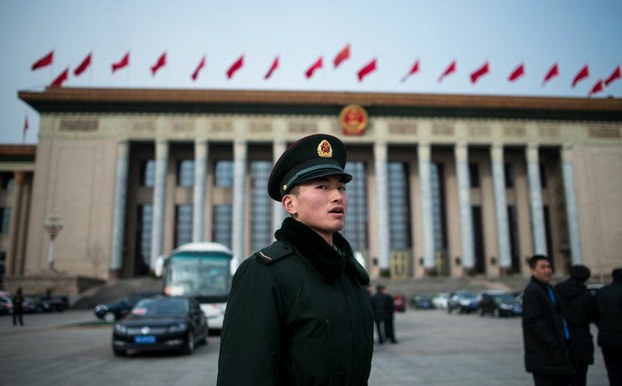China to spend 'at least' U.S.$25 billion on 'maintaining stability'
| Publisher | Radio Free Asia |
| Publication Date | 8 March 2016 |
| Cite as | Radio Free Asia, China to spend 'at least' U.S.$25 billion on 'maintaining stability', 8 March 2016, available at: https://www.refworld.org/docid/570f425b2b.html [accessed 26 May 2023] |
| Disclaimer | This is not a UNHCR publication. UNHCR is not responsible for, nor does it necessarily endorse, its content. Any views expressed are solely those of the author or publisher and do not necessarily reflect those of UNHCR, the United Nations or its Member States. |
2016-03-08
 Security guards patrol outside the Great Hall of the People in Beijing during the second day of the National People's Congress, March 6, 2016. AFP
Security guards patrol outside the Great Hall of the People in Beijing during the second day of the National People's Congress, March 6, 2016. AFP
China has published limited figures for its projected spending on domestic security and law enforcement in the name of "stability maintenance," although analysts said the true sum is likely to be much higher.
"Spending on public security will be 166.8 billion yuan (U.S.$25.6 billion), a rise of 5.3 percent [compared with 2015]," a statement summarizing budget expenditure for central and local governments on the ministry of finance website said.
The figure compares with a military budget for 2016 of around 950 billion yuan (U.S.$146 billion).
The ruling Chinese Communist Party's total spending on domestic security outstripped defense spending for the first time in 2013, but since then, the government hasn't published a total spending figure for "stability maintenance."
The "stability maintenance" budget includes funding for a plethora of law enforcement agencies and committees, including state security police who target peaceful activists, political dissidents, religious believers and ethnic minority groups as potential "threats" to social stability.
Bruce Lui, journalism lecturer at Hong Kong's Baptist University, said the stability maintenance budget as listed by the finance ministry doesn't include unofficial detention centers, private security guardsor gangs of hired muscle often used by local governments to enforce unpopular decisions, however.
He said in an interview with local media that locally hired "interceptors" sent to Beijing to detain anyone who complains about local authorities aren't included in the ministry of finance budget.
Lui said the inclusion of those figures could easily take the overall figure beyond that given for military spending.
Beijing-based evictee and rights activist Ni Yulan said the budget is getting ever larger because the number of people with a grievance is growing too.
"There are so many victims, petitioners, who have been evicted, or had their land taken away," Ni said. "That's why the budget for stability maintenance keeps on rising."
"They have definitely hired more people to deal with petitioners, for example, and I think that must take up a large part of the stability maintenance budget."
Meanwhile, as delegates gathered for the annual session of the National People's Congress (NPC) in Beijing, rights activists said they were prevented from traveling to the Chinese capital.
No room for critics
Zhengzhou-based rights activist Li Weijie said he had been prevented from traveling to Beijing to apply for a U.S. visa to attend a professional conference.
"They stopped me from going to Beijing because the NPC is in session, and they are stopping people from all over China from going there," Li said. "Their chief said it should get easier once the NPC is over."
He said he is now under surveillance by the state security police.
"They arrived to begin surveillance at the foot of my apartment building a day before the NPC opened, and there was a car following me the next morning ... Then their chief stopped me at the railway station."
Meanwhile, the authorities have also clamped down on any online discussion of the NPC annual session in Beijing, which is often targeted for criticism over its lack of meaningful opposition to government policy and the high-end designer labels worn by some delegates, activists told RFA.
"We see this phenomenon every year around the parliamentary sessions," online free speech activist Wu Bin said.
Wu said his social media accounts and blog have recently been shut down after he posted two articles online linked to the NPC.
"It's getting worse and worse," Wu said. "My posts weren't just deleted this year; my entire account was shut down."
"A lot of tweets, blog posts and accounts are getting deleted; there's no room to exist any more, if you like to say things that are critical of the government," he said.
Anhui-based dissident Shen Liangqing said the chilling effect on social media posts was clearly visible this year.
"The Chinese Communist Party has always had a monopoly on power, and the delegates to the NPC are basically their buddies, hand-picked by them," Shen said.
"There is no participation for the general public in Chinese politics, and they won't allow you to take part even if you want to," he said. "They want to run everything about our lives, and you're not allowed to have an opinion."
"Things are getting much more hard line, ideologically speaking," Shen said.
Reported by Yang Fan for RFA's Mandarin Service. Translated and written in English by Luisetta Mudie.
Link to original story on RFA website
